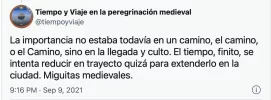JabbaPapa
"True Pilgrim"
- Time of past OR future Camino
- 100 characters or fewer : see signature details
There is an interesting study project on concepts of Time and Pilgrimage supported by the Xunta de Galicia ; briefly described here :
Those interested in various aspects of such questions will find different things in here, and personally I like the direct quotes from old sources.
10th/11th Century :
Peregrinantes in tres clases diuiduunt: prima est eorum qui sanctorum oratoria pietatis causa frequentant; altera poenitentium, quibus peregrinatio in poenam indicta est, vel qui sponte eam suscipiunt; tertia morientium, qui in loco sancto sepulturam eligunt.
(Three types of pilgrim -- those with a purpose of devotional prayer to the Saint ; those travelling penitentially, either of their own motivation or mandated thereto by a penalty ; and the dying, wishing to reach the holy place to be interred there.)
12th Century :
Aquellos que van en peregrinación a un santuario reciben en la iglesia el bordón y la escarcela bendecidos. Cuando ellos van a los santuarios con motivo de penitencia, les damos el bordón y la escarcela bendecidos, según la costumbre eclesiástica.
(Those departing on pilgrimage for penitence to a sanctuary, are given a pilgrim staff and a scrip by their church, blessed for the journey according to custom.) -- Modern equivalent, hiking poles and a backpack.
A summary article that appeared in the revue Galicia Histórica is reproduced on pp. 42-43 of the pdf.
https://www.catedradelcaminodesantiago.com/media/uploads/1642511657_Memoria_final-Tiempo_y_viaje.pdf
Those interested in various aspects of such questions will find different things in here, and personally I like the direct quotes from old sources.
10th/11th Century :
Peregrinantes in tres clases diuiduunt: prima est eorum qui sanctorum oratoria pietatis causa frequentant; altera poenitentium, quibus peregrinatio in poenam indicta est, vel qui sponte eam suscipiunt; tertia morientium, qui in loco sancto sepulturam eligunt.
(Three types of pilgrim -- those with a purpose of devotional prayer to the Saint ; those travelling penitentially, either of their own motivation or mandated thereto by a penalty ; and the dying, wishing to reach the holy place to be interred there.)
12th Century :
Aquellos que van en peregrinación a un santuario reciben en la iglesia el bordón y la escarcela bendecidos. Cuando ellos van a los santuarios con motivo de penitencia, les damos el bordón y la escarcela bendecidos, según la costumbre eclesiástica.
(Those departing on pilgrimage for penitence to a sanctuary, are given a pilgrim staff and a scrip by their church, blessed for the journey according to custom.) -- Modern equivalent, hiking poles and a backpack.
A summary article that appeared in the revue Galicia Histórica is reproduced on pp. 42-43 of the pdf.













